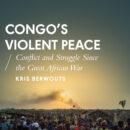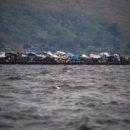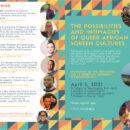African Civil Society Demands More from Governments and African Union on ICC
As a two-day meeting between the 30 original African signatory countries to the ICC draws to a close, the peace-versus-justice debate continues to impact civilians on the ground and divide how Africa’s conflicts are addressed by advocates and policymakers.
This couldn’t be any more true than in Uganda and the Democratic Republic of Congo, where peace advocates argue that if it weren’t for the International Criminal Court‘s arrest warrants on Joseph Kony, Thomas Lubanga and Bosco Ntaganda, greater prospects for peace might exist through a viable peace process and stronger support for traditional reconciliation mechanisms. Justice proponents, however, argue that the international judicial mechanisms, absent any legal or judicial system, are necessary to enforce the laws, punish the perpetrators, and implement a peace process.
In my personal conversations with Darfuris and other Sudanese, they felt strongly that the ICC was the only body they could trust to bring justice to their lives. Lacking a viable and internationally-supported peace process for Darfur and a fledgling North-South Comprehensive Peace Agreement, many Sudanese have lost confidence in the ability of the Khartoum government to provide its citizens with any fair or legitimate legal recourse. For them, that means living peacefully, free from harm, with greater representation in government, greater access to wealth and resources, compensation for the damages incurred and punishment for the perpetrators — including President Bashir.
Nearly 70 African civil society groups recently organized in Kampala and Cape Town to express their support for the ICC and Darfuri wishes, arguing that the Court plays a necessary role when their governments are unable or unwilling to investigate and prosecute war crimes, genocide, and other crimes against humanity. Recognizing that their governments originally were supportive of the Court’s creation, they now demand that those same African countries and institutions, including the African Union, show greater support for the ICC. A number of op-eds stating these positions have been published this week by civil society representatives, including from Uganda Coalition for the International Criminal Court, as well as the Central African Republic.
Just one week after these civil society organizations gathered, nineteen African leaders met on June 8 for the COMESA Summit in Zimbabwe to discuss the economic and political future of the regional bloc. Sadly, rather than heeding their people’s demands and cries for justice and legality, the group issued a statement calling for a suspension altogether of the ICC arrest warrant against Sudanese President Omar el-Bashir.
So it seems that despite the people’s demands, and the fact that thirty of the original signatories to the Rome Statute were African, African leaders prefer making decisions regarding the ICC and Darfur not based on the people’s wishes, but on theirs. Let’s hope this week’s meeting in Addis Ababa bears a more fruitful result that supports the needs of the Darfuris, Ugandans, and Congolese civilians on the ground.
Semhar Araia is an Africa analyst and consultant living in Washington, D.C.







Ah yes, the ol’ “if you disagree with the arrest warrant, then you’re turning a deaf ear to what Darfuris want” argument. If I didn’t know better, I’d think John Prendergast wrote this.
While I’m generally all for advocating for what Darfuris want and have deep concerns about Comesa’s motives for calling for suspension, let’s think about what the ICC arrest warrant has done for Darfuris so far. Instead of immediately and aggressively leveraging the warrant against Bashir, which is what the international community should have done to make the warrant useful, they just sat around while Bashir kicked out aid organizations in retaliation – which is what people who had reservations about the warrant said would happen. Especially because the international community has demonstrated its inability to strike while the iron is hot, so to speak, I find it might not be unhelpful to listen to bodies like the AU, which assert that the warrant endangers peace in Darfur. If all we do is tell Bashir what a bad boy he is, then stand by and let Darfuris suffer the consequences of his ensuing tantrum, how does that lead to justice or peace for Darfuris?
Additionally, you seem to cite your conversations with Darfuris as anecdotal evidence of wider support for the ICC among the Darfuri community. First off, what percentage of the 2.7 million displaced people do those Darfuris represent? What was your sample size? Was the sample random? Secondly, what exactly did these Darfuris say in support of the court? Is justice the most important thing to them? Is it more important than peace? Would they still support Bashir’s prosecution over a diplomatic solution if it meant that their fellow Darfuris had to continue living in camps for – say – an extra year?
Depending on how you count, there’s only one democracy in Africa that respects civil rights as much as any country in the world, that people would agree on, and that is Botswana. Guess where they come out on the ICC? You can guess. But I can tell you: they fully support the ICC and want al-Bashir to face trial. I’ll put one Botswana against twenty AU members anyday.
Anyone who wants to say there is merit to the argument that the ICC hinders peace is really just saying this: “I think most African leaders are too willing to kill and kill again for anyone to try to do anything to stop them.” Implicitly they have Charles Taylor in mind: Elect me, or else! But guess where Charles Taylor is today? Impunity can be ended. But not by constantly backtracking. (At the least, only backtrack when the person facing justice sets in motion some irrevocable unwinding, like leaving the country for a third country.)
And …. in my opinion the whole point of justice is that is doesn’t “do something for somebody”… it does something for everybody.
Ana
So it appears that African states didn’t withdraw en masse from the Rome Statute and this is heralded as a victory for the ICC. If that is a victory then the tables have surely been turned.
This article is a pathetic attempt to defend a politicised kangaroo court that apparently believes justice is reserved only for the third world.
I commend African countries for shunning this enitity that believes it has the right to remove Africas right to a judiciary, While ignoring the numerouse documented crimes in the western world. The hard earned soverighnty of Africa is not up for renegotiation with internationlist western proxy institutions.
I forsee that ICC members will organise a mass withdrawel with countries such as sengal,comoros,and djibouti having already privately expressed their courageouse desition to with draw from this politicised entity that intends to strip away african indpendance.
Though it goes to show how the tables have turned, that the ICC is actually celebrating the fact that they havent had a mass with drawal From africa yet. When a couple of month ago this same institution was bragging that it could have bashir with in custody in a few weeks..
The way that the debate over Africa and the ICC has been constructed by western human rights activists is both damaging and misleading. The African Union and its member states have been absolutely firm in their position against impunity for crimes against humanity, war crimes and genocide. The Constitutive Act of the AU is much tougher on these crimes than anything in the UN Charter. If you read the resolutions of the AU PSC and the Assembly of Heads of State the language is just as tough as anything in the UN Security Council. The idea that Africans are against accountability is sheer nonsense.
The main source of discontent in the AU is that Africa, from the outset, saw the Sudanese problem in its entirety. Africa does not have the luxury of adopting abstract principles which are very costly to implement, in a region which is already fragile. Africa is already apprehensive about the fact that more than 60% of the UN Security Council business concerns Africa, but there is no African permanent representative on the Council. After the AU PSC was created in 2002, there was a tacit understanding that the UNSC would at least take heed of AU PSC decisions and listen to African voices. Kofi Annan was able to make that work diplomatically. Everyone knew that the UNSC had the real power, but there was enough accommodation given to the AU PSC to make Africa feel properly consulted.
That didn’t happen over the ICC issue. The AU PSC decision of July 2008 was not a decision in favor of impunity. Quite the contrary. It was extremely tough on Sudan. But the AU wanted the overall picture to be taken into consideration including a peace process (headed by an African) and a peacekeeping mission (whose members are almost all African) and a national peace agreement (mediated by an African organization, IGAD). That AU PSC decision was unceremonially shunned.
Since then the entire debate about the AU and the ICC has been conducted at the expense of the AU, with all kinds of unsubstantiated insinuations about the organization and its leadership. The chief unhappiness of the Africans remains the way in which the AU PSC’s considered opinion, unanimously adopted, was shunted aside by the UNSC.
Meanwhile the ICC has made a strategic blunder. The prosecutor ought to know perfectly well that he will not get President Omar al-Bashir in court any time soon. And he ought to know that he needs the support of Africa. He could perfectly well have gone to the AU and said that he appreciates its position, but he is a prosecutor and not a judge of political consequences, so he wants an arrest warrant against al-Bashir but is not the right person to decide on whether this is in the interests of peace and security, and then kept out of the debate. Africa was ready to work with the ICC, but just demanded a bit more consideration, and would have accepted that. Instead, the ICC prosecutor has been campaigning against the Article 16 deferral demanded by the Africans and in doing so has made himself seem the pawn of a Franco-British agenda for imposing the ICC on Africa.
By turning the question from one of consultation and due participation in decision making into a highly ideological issue of impunity, for-or-against, the ICC and its supporters have unnecessarily antagonized African leaders, polarized African stakeholders, and have led the debate into a sterile direction.